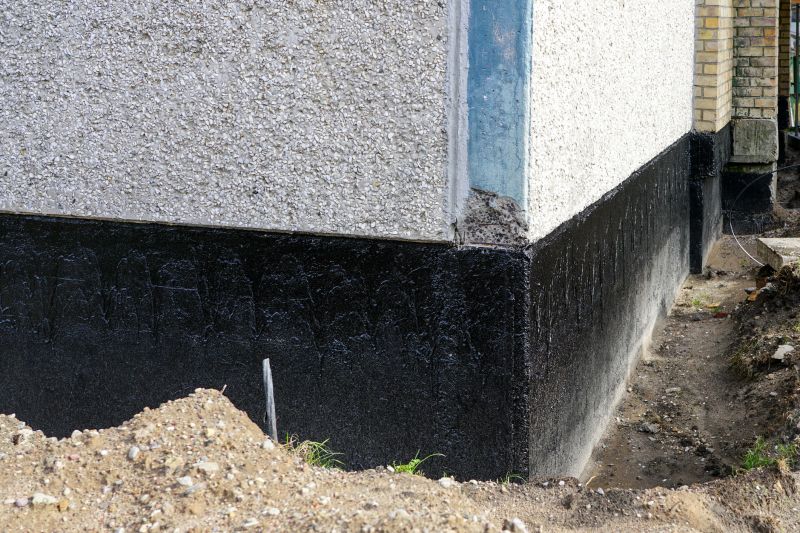Top Waterproofing Products for Reliable Protection
Explore the leading waterproofing solutions designed to keep your structures dry and secure in any environment.
 Waterproofing products are essential for protecting structures from moisture intrusion, preventing water damage, and maintaining the integrity of foundations, roofs, and other surfaces. These products come in various forms, including sealants, membranes, coatings, and paints, each designed to address specific needs and application environments. Choosing the right waterproofing solution depends on factors such as surface type, exposure conditions, and project scope. Proper application and selection can significantly extend the lifespan of buildings and infrastructure, reducing maintenance costs over time.
Waterproofing products are essential for protecting structures from moisture intrusion, preventing water damage, and maintaining the integrity of foundations, roofs, and other surfaces. These products come in various forms, including sealants, membranes, coatings, and paints, each designed to address specific needs and application environments. Choosing the right waterproofing solution depends on factors such as surface type, exposure conditions, and project scope. Proper application and selection can significantly extend the lifespan of buildings and infrastructure, reducing maintenance costs over time.
Top Overall Option
Multi-Function Waterproofing Membrane
A versatile waterproofing membrane that offers a seamless barrier suitable for various surfaces including roofs, foundations, and basements. It is designed for easy application and provides durable, flexible protection against water intrusion. Ideal for both DIY enthusiasts and professionals seeking reliable performance in diverse environments.
Types of Products For Waterproofings
Liquid Waterproof Coatings
Fluid coatings that form a seamless waterproof layer on surfaces such as roofs, decks, and foundations.
Bituminous Membranes
Sheet-based membranes made from asphalt or bitumen, commonly used for roofing and below-grade waterproofing.
Polyurethane Sealants
Flexible sealants ideal for sealing joints, cracks, and gaps in various structures.
Cementitious Waterproof Coatings
Waterproof coatings based on cement that are suitable for basements, tunnels, and water tanks.
Rubberized Waterproofing Sheets
Sheet membranes made from rubber compounds, offering high durability and flexibility.
Bitumen-Based Coatings
Coatings that provide a protective water-resistant layer for roofs and foundations.
Acrylic Waterproof Paints
Paints that create a water-resistant surface suitable for exterior walls and terraces.
Polyethylene Sheets
Heavy-duty plastic sheets used for basement and pond linings.
Liquid Rubber Coatings
Rubber-like liquid coatings that cure to form elastic, waterproof layers.
Concrete Sealers
Sealants designed to penetrate and waterproof concrete surfaces.
Waterproofing Additives
Additives mixed into concrete or mortar to enhance water resistance.
Spray-On Waterproofing Systems
Sprayable membranes that provide a quick and uniform waterproof layer.
Popular Choices
Widely used for various surfaces, offering seamless protection when applied correctly.
Commonly selected for roofing projects and below-grade waterproofing due to their proven durability.
Popular for sealing joints and cracks in both residential and commercial settings.
Favored for underground applications and water tanks because of their compatibility with concrete surfaces.
Chosen for their flexibility and long-lasting performance in demanding environments.
Often used on exterior walls and terraces for easy application and effective water resistance.
Preferred for pond linings and foundation waterproofing due to their strength and inert properties.
Popular for roof coatings and waterproofing decks because of their elastic properties.
Commonly applied to protect concrete surfaces from moisture penetration.
Used to enhance water resistance of concrete and mortar in various construction projects.
Chosen for their convenience and ability to create uniform waterproof layers on complex surfaces.
In residential settings, waterproofing is often applied to basements, crawl spaces, and roofing systems to prevent leaks and dampness. Commercial and industrial projects may require more robust solutions like liquid membranes or sheet membranes that provide a durable barrier against water ingress. Additionally, waterproofing products are used in outdoor landscapes, terraces, and retaining walls to manage water flow and prevent erosion. With an array of options available, understanding the specific characteristics and suitability of each product type is crucial for achieving effective and lasting results.
Applying waterproofing products correctly often involves surface preparation, such as cleaning and priming, to ensure proper adhesion. Some products are designed for DIY projects, offering ease of application, while others may require professional installation for optimal performance. Regular inspections and maintenance can help identify potential issues early and ensure the waterproofing system continues to function effectively. Whether for new construction or renovation, selecting appropriate waterproofing materials is a key step toward safeguarding properties from water-related damages.
Key Buying Considerations
- Determine the specific surface type and its exposure to water or moisture.
- Assess whether the project requires a liquid, sheet, or spray-on solution.
- Consider the flexibility and durability needed for the application area.
- Check compatibility with existing materials such as concrete, wood, or metal.
- Evaluate ease of application, especially for DIY projects versus professional installation.
- Review the product’s resistance to UV rays, temperature fluctuations, and aging.
- Identify if the product is suitable for below-grade or above-grade applications.
- Look for products with good adhesion properties to prevent future leaks.
- Consider the drying or curing time to fit project timelines.
- Ensure the product’s safety data and suitability for indoor or outdoor use.
- Verify the product’s ability to withstand ponding water or standing moisture if applicable.
- Assess the need for additional primers or surface preparation products.
- Review maintenance requirements and lifespan expectations.
- Check for compatibility with other waterproofing or building materials used in the project.
- Be mindful of local building codes and regulations regarding waterproofing materials.
